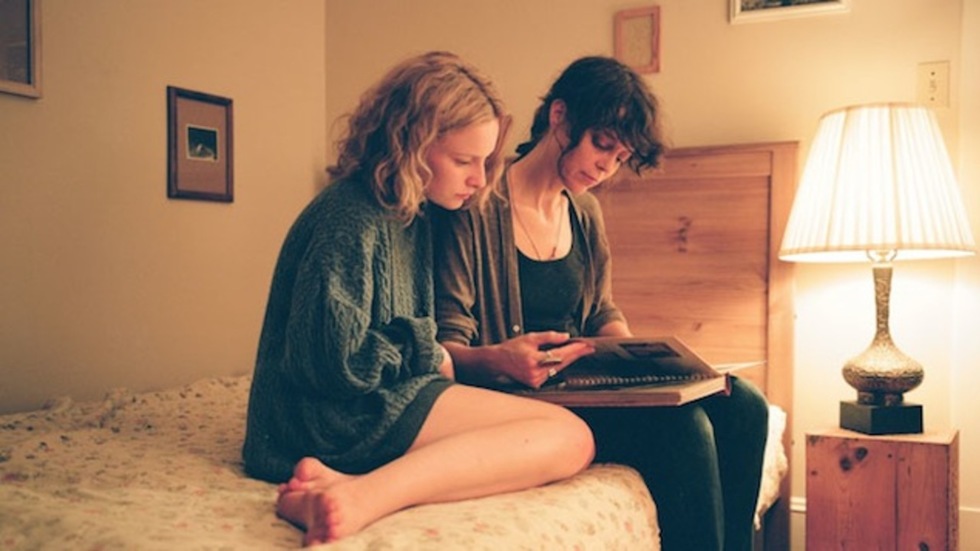
BY ZACHARY WIGON |
Interview: Director Matthew Porterfield on 'I Used to Be Darker'
Matthew Porterfield's microbudget indie "I Used to Be Darker" is getting great reviews. We talked to the director about his film's unique style.

Matthew Porterfield lit up the indie film circuit with Putty Hill, a doc-narrative hybrid about a community on the outskirts of Baltimore. He's back with I Used To Be Darker, a feature narrative that unfolds at its own deliberate pace.
Unhurried and unconcerned with the pacing and stipulations of the "traditional cinematic narrative" (whatever that may be), Matthew Porterfield garnered himself a respectable indie-film following when his last feature, the doc-narrative hybrid Putty Hill, debuted at the 2010 Berlin Film Festival. After receiving distribution (via Cinema Guild) and rave reviews for the picture, Porterfield is back with I Used To Be Darker, which is certainly as buzzed-about a film as a micro-budget indie can be. Purely a narrative feature, I Used To Be Darker explores the fraught minefields of interpersonal relationships as they fray - and, perhaps, strengthen. It follows Taryn (Deragh Campbell) a runaway Irish teen who comes to stay with her aunt's family during a wayward summer. The only problem is that her aunt (Kim Taylor) and uncle (Ned Oldham) are in the process of separating, and her cousin Abby (Hannah Gross) is understandably stressed by the whole situation. With each of these four characters caught in the midst of transitional periods they have yet to convince themselves they'll ever escape, difficult emotional confrontations are bound to occur, and do - but make no mistake, I Used To Be Darker is no shouting-match kitchen-sink drama. Rather, by its subtle narrative mode of leaving much unsaid and more only hinted at, Porterfield constructs a tone poem that provides the audience with the space to fill in many of the film's blanks themselves.
I had the chance to speak recently with Porterfield about the impressive picture.
Tribeca: What is your relationship toward backstory and exposition like? You leave many pieces of information out, and I wonder what the process is like of parcelling all that out.
Matthew Porterfield: I think about it quite a lot - I spend a lot of time thinking about the characters and their backstories. I usually work from the inside out, trying to fully develop a world. I tell as much as I can through images and sounds, and try to use dialogue less. In my first film I tried to avoid dialogue almost entirely - I don't like to feel like I'm being told everything through the dialogue. Part of the fun of making this film was figuring out how much we needed to explain in order to keep people involved in the story, and how much we needed to withhold, because I think less can be more. It's good to let audiences think beyond the screen, which is my goal.
Tribeca: What's the process of making those determinations like?
Matthew Porterfield: There's a little bit of mystery involved, and I'm okay with that, but definitely it's a lot of conversations with my co-writer and I - we did about ten drafts of the screenplay. For example, in one draft, Taryn had been pregnant the summer before. We made the decision that it would be more powerful if she had just found out she was pregnant as the film starts. That way she's in a transitional period. I like characters in transitional periods - those are the characters I want to write about. I don't like characters who always know what to do - I like characters who are trying to decide how they feel. So we tried to give just enough for audiences to be guessing a little bit as to what's going on.
Tribeca: You mention an interest in characters in transitional periods - in this film so many characters are in a state of limbo. Can you tell me more about what makes that state of being so interesting to you?
Matthew Porterfield: I feel like it's a very human experience that isn't often portrayed in film. I feel like most stories we see onscreen are about a character who is declaring their will - they've made a decision in response to a particular conflict, and the film is about how their will plays out, how they articulate their will. I don't know many people like that. I mean, we all make decisions, but we make decisions based upon any number of things, and often it's very hard to decide how you feel or how you're going to act. It seems like a natural state to put characters in, a place that feels very human, very real, very open to interpretation.
Tribeca: There's a strong deterministic drive in most contemporary narratives, that's true. This is a film about affect and atmosphere. There's a real sense of honesty, of the genuine, that came across for me in the film. Is that the tone you're after?
Matthew Porterfield: That's what I want to achieve - something authentic. I'm not going to fool myself and say that this is real, it's just a representation, but I think it can have a kind of truth-value. I'd like to achieve honesty in my work. I think a lot of it comes through the collective, the process of working with the cast, communicating to them so they have this shared idea of what the film is going to be. I think we achieved that - I'm very happy with the performances. It's a world that we're trying to create.
Tribeca: How do you imagine the ideal audience member watching this film? Because like you said, this style of storytelling isn't found too often in films today.
Matthew Porterfield: Sometimes I appreciate the passive experience as a moviegoer, but normally I'm more excited when I have to be active, and I want audiences to have that kind of experience. As an audience, you have to go in and accept that this story isn't going to have a big arc, even though it deals with a number of big themes - it takes place over the course of just a few days. There's no huge action, no big conflict or set pieces. And of course there's also no stars. What I really want is for people to be willing to approach the characters onscreen the way they might approach people in real life. When you meet someone, you're trying to make sense of them - who are they? What do they want? Are they like anybody I've met before? That experience is different from going to the movies and seeing an effective performance by an actor we all know and love. I think you have to be willing to approach people you've never seen before, which we do every day but we do less often in the cinema.
Tribeca: Speaking of audience participation, there are a number of scenes in the film where the characters' faces are partially or entirely obscured or obstructed. One of the last scenes in the film is shot that way. What's your philosophy behind that aesthetic choice?
Matthew Porterfield: I think it's about taking a position of respect toward the characters. In that scene toward the end, there was no question that I wanted to film Taryn from behind. That moment - we're voyeurs to that moment. Putting the camera in a position of respect, of distance, is interesting to me. It's a choice I like to make. I like to think about where we're watching people from. There's personal reasons behind it. In my own life I have a lot of trouble with interpersonal conflict, and I think I do in my films as well - there's a way in which I like to keep my distance when people are in a space where there's potential conflict.
Tribeca: It also allows the audience's imagination to do some of the work, with respect to creating the emotion in the scene.
Matthew Porterfield: But it's risky too - there are some people who are just going to say, Jesus, it's just a shot of a girl's back. But the audio is intimate, and we have been seeing her the whole film.
Tribeca: How did you find Deragh Campbell? She was superb, and this was her first screen performance.
Matthew Porterfield: I met her - and Hannah, who plays Abby - after a screening of Putty Hill in New York. We kept up a correspondence and then I auditioned Hannah for the film, and Deragh wrote me saying she wanted to audition for Taryn. She auditioned over Skype. It was clear that she could do the dialect, and she had an interesting physicality - the way she moves in space is really distinct. I really like watching her move through spaces. She's from Toronto but her mom is from Belfast.
Tribeca: To what degree did the role of Taryn change after Deragh was cast?
Matthew Porterfield: Well, I feel like the role always changes after you cast someone. Sometimes I'll write a role with a type in mind, but I think Deragh brought a kind of fragility - but also an impulsiveness - that the character needed. There's a simmering violence underneath the surface even though she's so lithe and demure. She changed from being a kind of tough farm girl, a kind of stereotype that we'd written, into something more sophisticated, which has to do with Deragh and her maturity.
Tribeca: And Kim Taylor and Ned Oldham, they are professional musicians - so was that always the plan, to cast actors who are musicians as well?
Matthew Porterfield: It became an idea we had as we were writing. First we knew Ned's character would be a musician. Then I was introduced to Kim, and I connected with her instantly. We started writing first with her music in place, even before we'd offered her the role. I'd known Ned for some time - I love him as a person, I auditioned him, he had a real nervous energy - and I was betting that he would be able to shake the nerves and get to this place that he's in in life. But of course it's a performance, so Ned did this performance of himself with all this pathos and awkwardness and tension, and it was a total revelation, I thought his performance was really incredible, as was Kim's. I was banking on the fact that these two are musicians, they know how to perform, they have control of their bodies and voices and understand what it means to deliver a performance. No matter what song you're doing, a song is a performance. In the end, it really worked.

